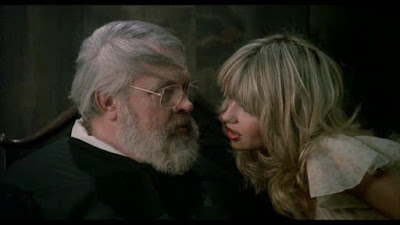 |
| Images courtesy of Analysis Releasing |
All of this led to The Witch Who Came from the Sea producer-director
Matt Cimber’s near inescapable career-killer Butterfly, among Cain’s
most notorious novels and one of the first truly infamous Golden Raspberry
Award nominees that is remembered more for turning its newbie starlet Pia
Zadora into a dartboard for critics angry over her husband Meshulam Riklis’
efforts to more or less buy her Golden Globe win for Best New Star of the Year
in a Motion Picture. Almost out of
principle, Pia Zadora became the first actress to win both the Golden Globe and
the Golden Raspberry for Butterfly before copping the Razzie again a
year later with the infinitely shoddier and tawdrier The Lonely Lady before
trying her hand at the musical comedy with Voyage of the Rock Aliens. Either way, Butterfly while not nearly
as bad as people have made it out to be is rather sleazy and just a little bit
bonkers, an attempt at adapting a great author’s most controversial work and
turning out more oddly funny than steamily provocative.
1937 Nevada-Arizona in the desert resides bearded miner Jess
Tyler (Stacy Keach) who is the caretaker of an unused silver mine, abandoned by
his wife Belle Morgan (Lois Nettleton) and two daughters Janey (Ann Dane) and
Kady (Pia Zadora) who at the age of 17 reappears on Jess’ property. Strutting about barefoot and scantily clad in
a thin dress, Kady presents herself and explains her mother Belle is now
running a brothel and one of her clients impregnated Kady with a son. Kady, driven by money, has in fact returned
home to try and take a crack at the silver mine which her father Jess seems to
agree to help out with, but not before she herself makes more than a few overt seductive
passes at daddy Jess with the awkward incestuous sexual tension thickening in
the air. From here, other former figures
in Kady’s life begin showing up including but not limited to her wealthy beau
Wash Gillespie (Edward Albert) and mercurial figures trying to get a piece of
the silver mine begin closing in, all the while Kady continues to ramp up her
seducing attempts with Jess.
Before digging into the mixed and kind of goofy tawdry
sweeping epic historical romance sexing onscreen, it is important to note this
project was financed in full by Pia Zadora’s husband Meshulam Riklis
independently roughly around $3.5 million and subsequently flew in several
members of the Hollywood Foreign Press Association to Las Vegas to hear the actress
sing the film’s title track It’s Wrong for Me to Love You. Coupled with her Golden Globe win over
Elizabeth McGovern as well as Kathleen Turner, the fact that the award wins
were more or less bought by Zadora’s husband instantly made Butterfly a
particular target of critical ire. Despite
boasting arresting cinematography by Eduard van der Enden (Lifespan) and
a more than overqualified moody score by Ennio Morricone and a mostly solid
ensemble cast including but not limited to Orson Welles in his final role, Butterfly
for all of its technical virtues is a beautiful looking and sounding
misfire.
The same year, director Matt Cimber and co-writer John Goff,
reunited with Zadora for another picture called Fake-Out which also got poor
reviews but nowhere near the notoriety Butterfly stirred up. After Pia’s “win”, the Golden Globes and
Foreign Press Association decided to do away with the category altogether. While taking the credibility of the project
down several notches with her sex-kitten nymphomaniac characterization and
performance, one wonders whether or not a scruffy crusty picked Orson Welles
appearance would’ve saved the film. For
all the skillful supporting elements and a strong performance from the always
great Stacy Keach, the main reason to watch this movie isn’t for a daring Hollywood
drama but for some corny and kind of crazy sleaze.
Much of it stems from Pia in a performance that could sit
comfortably within the Cannon Film catalog.
Despite the silliness and the amount of naked skin onscreen, Pia to her
credit does kind of attack the role with all she has and isn’t afraid to get
her feet and hands dirty. While treated
as a sex object in both this and The Lonely Lady, making one wonder what
the real motives were behind her husband’s film productions, Pia holds her own
and seeing her inches away from Orson Welles during her “award winning”
courtroom speech is a most rare screen opportunity. Though objectively speaking Pia in the role replete
with the film’s dialogue is laughable, she makes this miscalculated and
perverse dreck highly entertaining to watch unfold as she kind of bumbles from scene
to scene hobnobbing with major Hollywood talents.
While understandably tarred and feathered before being
burned at the stake from the ground up, Butterfly did garner some
measure of attention for the behind-the-scenes shenanigans that led to Pia
Zadora’s Golden Globe win followed by notoriety surrounding the curious object
that is the film itself. Just how did so
many major names get involved in something like this? Moreover, how do you take a renowned literary
provocation and turn it into a camp laden hoot with more than a few perplexing
if not unnerving artistic choices? In
the years since, both Pia Zadora and director Matt Cimber have long moved on
with Cimber’s next big endeavor being the co-creator of Gorgeous Ladies of
Wrestling which was financed by Meshulam Riklis before Pia Zadora pulled
the plug after too many instances of Riklis ogling the ladies.
Looking back on Butterfly, the film is far from inept
with some lovely production values and a soundtrack that, sans the Zadora
track, is well worth listening to on its own.
Pia Zadora might have the stigma of being one of the “Worst Actresses of
the Century” but it is hard to imagine this movie being what it is without
her. Whether she wrecked a potential
masterwork is open to debate but her presence in the film is part of what makes
this a misbegotten crazy camp classic.
Its most certainly not “good” per se but it is compulsively entertaining
for mostly the wrong reasons.
--Andrew Kotwicki





